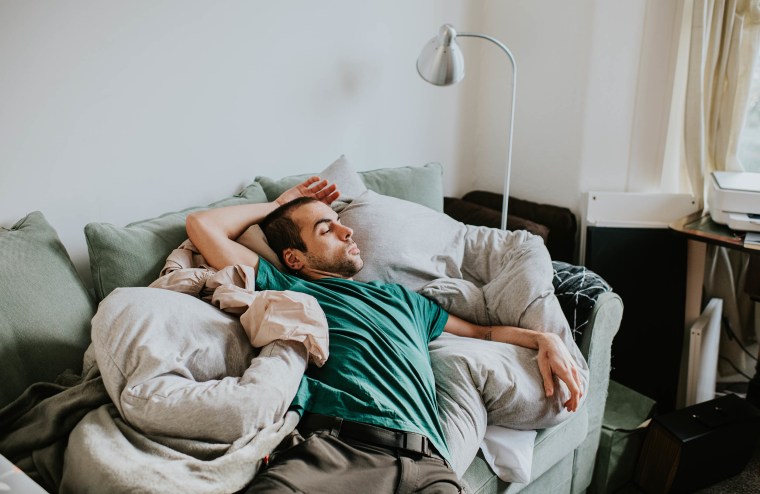While the natural inclination for many of us this time of year is to buy more, do more and be more, experts say to preserve your mental health, try a new approach: doing nothing at all. Mastering the art of doing nothing not only reduces stress, especially during the holidays, but it can also lead to some surprising health benefits.
Doing nothing: What counts?
The definition of "doing nothing" can vary from person to person, but its focus is turning away from distractions or demands and instead giving yourself space to be silent and mindful of your thoughts and feelings. This could mean meditation or simply sitting alone in a room without any distractions present.
“Doing nothing means giving your mind a rest by not expending your precious and limited cognitive resources and attentional capacity,” says Gloria Mark, Ph.D., author of "Attention Span: A Groundbreaking Way to Restore Balance, Happiness and Productivity."
Truly doing nothing, she tells TODAY.com, means turning off the TV and other media and unplugging from other people.
For some people, doing nothing means choosing less stimulation instead of none at all. There are also benefits to moving away from demanding tasks and self-imposed pressures and instead allowing the brain to switch to inconsequential thinking. Andrew Brodsky, Ph.D., assistant professor of management at The University of Texas at Austin's McCombs School of Business, tells TODAY.com.
“This may include mindless activities like scrolling on your phone or looking at the stars,” he explains. It could also mean silent walking or sitting alone in a park without talking to anyone or listening to anything. “These mental breaks have been shown in a variety of studies to be important for improving work productivity, creativity and personal wellbeing,” Brodsky says.
How can you tell if you're successfully "doing nothing"? Psychiatrist Dr. David Spiegel, director of the Center on Stress and Health at Stanford University, says doing nothing should “(allow) you to turn down ... the part of you that asks, ‘what should I be worrying about?’ and ... the part of you that questions, ‘what am I accomplishing?’ ... Such breaks cut you loose from routine expectations and allow you to think differently about who you are or should be."
The benefits of doing nothing
Depending on the degree to which you truly unplug, doing nothing for a brief period of time each day can improve your mental and physical health.
“Doing nothing offers our brains the ability to recover,” says Brodsky. He explains that detaching from constant stimulation or stressful experiences can help reduce stress and renew energy, leaving you better equipped to handle work or life challenges. “Additionally, doing nothing is useful for allowing our minds to wander or ruminate, which has shown to be valuable for creativity, as it allows our brain’s space to generate novel solutions to whatever problems we are facing,” he says.
Spiegel adds that even during busy day-to-day tasks, our brains can get used to monotonous routines — repetitions that can “become boring” and dull our cognitive thinking. “Taking a break refreshes your engagement with what comes next,” he says.
Doing nothing for a pre-determined period of time can also induce a state of relaxation, lower blood pressure, improve digestion, relax muscles and sharpen your focus, says Francine Toder, Ph.D., a retired clinical psychologist and faculty member of California State University.
“When you’re very busy, the stress hormone cortisol increases, and that raises your blood pressure, increases muscle tension and intensifies irritability. You need to actively do something to reverse the stress response, which is what ‘doing nothing’ or defocusing accomplishes," she tells TODAY.com.
At the same time, don't get carried away with doing nothing for stretches that last too long. “There is an ideal level of mental stimulation, and experiencing too little stimulation can often be as detrimental as being over-stimulated or overworked,” says Brodsky.
How to get better at doing nothing
Doing nothing isn't easy for everyone.
Thanks to smartphones and the internet, you're almost always contactable, so "it can be hard to find time to ourselves,” says Brodsky. So, an important first step is silencing your cell phone or making sure you’re doing nothing in a place you aren’t likely to be interrupted.
It’s also important to “start slow — try 5 minutes at a time — otherwise this will feel overwhelming,” suggests Toder. Set aside a specific amount of time to do nothing. “Think of it as a self-imposed time-out or like a coffee break,” she adds.
If it’s a struggle to justify the time needed to engage in doing nothing, “remind yourself that you’re doing a good thing for your body and psyche,” Toder recommends. And if you’re a checklist type or someone who feels more motivated when setting goals, “make doing nothing a challenge unto itself,” advises Brodsky.
“Schedule in mental rest breaks the way you would stop to physically rest when you are taking a hike,” offers Spiegel. “Restore and refresh by taking a few minutes to enjoy a sunset, inhale fresh outdoor air, and focus on being rather than doing.”

